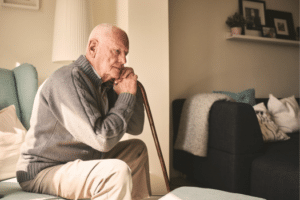May marks Mental Health Awareness Month in the United States, and it’s important to remember that anyone can suffer from mental health issues, big and small. That includes older adults. From depression and anxiety to dementia, seniors are often expected to be stoic, to keep their mental health issues to themselves, and that’s why Mental Health Awareness is so crucial! It serves to remind us that we are not alone and we should not be afraid to put ourselves out there and be vulnerable.
But what if an older adult family member is suffering silently? Thankfully, there are signs to look for, even if your loved one is trying to hide it.
What does poor or declining mental health look like?
One sure sign to look for is isolating behavior. If an older adult loved one is uncharacteristically showing little interest in hobbies or activities they’ve always enjoyed, it could be a sign of depression.
Dr. Patrick Arbore founded IOA’s Friendship Line in 1973 to combat social isolation and loneliness in older adults.
“We were very aware, even then, that loneliness and social isolation had a relationship to suicide and suicidal ideation,” he says.
The Friendship Line was created with the idea that even a 15-minute phone call can make a noticeable difference.
“It can impact the caller’s thinking about despair or hopelessness or depression,” Arbore says.
Another indicator that something might be wrong is a change in routine. That could be an unkempt home that’s always been tidy, suddenly missing appointments, or even sudden changes in personal care.
Finally, memory issues are something to keep an eye on. It can be tricky to determine what is the sort of forgetfulness that comes as we age, and what could be a sign of something like dementia, so you’ll have to use your judgment. If your loved one is repeatedly asking the same question even though it’s already been answered, misplacing items more regularly, or forgetting important dates or commitments, it might be worth a conversation.
How can you improve mental health?
There are many simple, straightforward ways to improve mental health, starting with some tried and true methods:
Exercise – Regular exercise has been shown to release chemicals that mitigate depression and anxiety, improves cognitive function, and lessens the likelihood of physical injuries like falls that could lead to deeper depression.
Socialize – One sure sign of depression is isolating oneself, and unfortunately, that only leaves a person more depressed. Simply having the support of a social group can be a huge boost to happiness, and like exercise, can have big benefits for cognitive function.
Learn something new – Taking on a new hobby isn’t just fun; the challenge of learning a new skill helps cognitive function, improves mood, and if it’s a social hobby, has all the benefits of that, as well.
Mindfulness – Whether through yoga or meditation or something else, taking the time to practice mindfulness is an easy way to improve mental health. Even just a few minutes of deep breathing has been shown to provide a noticeable boost. It calms the mind and body and helps us put stressors – a major source of anxiety – into perspective.







